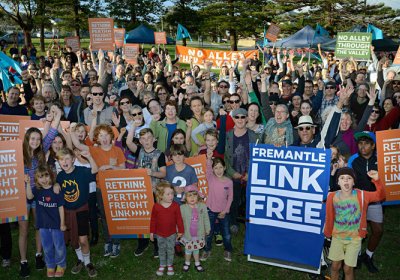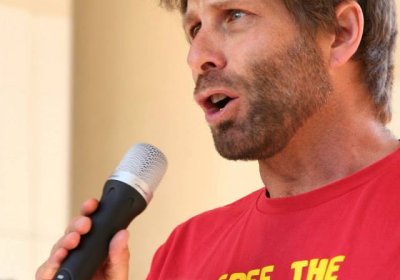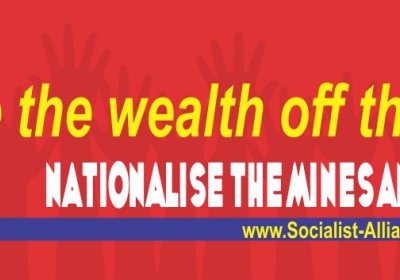On the day Tony Abbott was rolled, one of my family members, who lives in Malcolm Turnbull's electorate of Wentworth, posted a one line warning on Facebook: "Beware the silver fox." Well, it proved true remarkably quickly.
A concerted attack on Medicare is in full swing and it has one clear objective: dismantling public health care and replacing it with a US-style privatised system that costs more, delivers inferior outcomes and leaves the poorest to die.
Sam Wainwright
Over the last 18 months there has been a flurry of editorials and full page opinion pieces in Perth's only daily newspaper, The West Australian, demanding the state government keep its promise to build light rail to Mirabooka and unfavourably comparing Perth's infamous car dependent urban sprawl to European cities. It even ran a "tale of two cities" special feature celebrating the decision by Vancouver in the 1970s not to allow freeways into its inner city.
On July 26 more than 150 activists from around the country met in Melbourne for the National Refugee Rights Conference, hosted by the Refugee Action Collective (Victoria).
Many of the participants had attended the protest outside the ALP national conference the day before, and inevitably discussion revolved around the decision of the majority of delegates to reject an explicit ban on refugee boat "turn backs" which paves the way for Labor to once again follow Coalition policy.
On July 21 about 400 people packed the Fremantle Town Hall, with an overflow crowd of more than 100 gathered around an outdoor screen, as part of the campaign to stop the Perth Freight Link (PFL).
PFL is a $1.6 billion freeway project conceived by Prime Minister Tony Abbott with no local consultation or planning. Its purported function is to serve the growing number of truck movements to and from the container terminals at Fremantle port.
 Community resistance to the Perth Freight Link, a $1.6 billion freeway project proposed by the state and federal governments for the south-west region of Perth is growing at an explosive pace. The strength and depth of this opposition is now so strong that the issue will almost certainly dominate the next federal and state election campaigns.
Community resistance to the Perth Freight Link, a $1.6 billion freeway project proposed by the state and federal governments for the south-west region of Perth is growing at an explosive pace. The strength and depth of this opposition is now so strong that the issue will almost certainly dominate the next federal and state election campaigns.
Farmers are worried that the proposed privatisation of Fremantle Port will lead to a dramatic rise in their freight rates. The 800% rise in rents charged to stevedores by the newly privatised Port of Melbourne would be ringing some alarm bells.
Closer to home are the disastrous consequences of the privatisation of Western Australia’s freight rail network via a secret 49-year lease signed in 2000 when Premier Colin Barnett was Minister for Transport.
The demonising of asylum seekers is an elaborate exercise in racist scapegoating designed to distract Australians from the real causes of anxiety and insecurity in their lives. We need to be absolutely uncompromising in our resistance to this toxic agenda.
Prime Minister Tony Abbott's harsh regime of cutbacks and user-pays charges has been rejected by the Australian people in poll after poll. But this has not stopped the pro-business media from trying to wear people down and pressure Labor and the Greens to accept some of the government's demands.
Typical of this drumbeat was the widely reported Deloitte Access Economics report, which likened the growing budget deficit to a novel by horror writer Stephen King. In an effort to massage a consensus for cutbacks it demands, "For our budget to be sustainable, our politics has to be sustainable".
Clive Palmer is proving to be a more adept and unpredictable populist than many of us gave him credit for. The latest surprise was his decision to back the abolition of the carbon tax while opposing the scrapping of the Renewable Energy Target, Clean Energy Finance Corporation and the Climate Change Commission.
At long last the reality of the human rights crisis in Sri Lanka is appearing in the Australian media. Not just the fact that more than 40,000 Tamil civilians were killed by the Sri Lankan army in a month in 2009, but that Sri Lankans of all ethnic backgrounds continue to be subject to torture, rape, arbitrary detention, disappearance and death.
The Commonwealth Heads Of Government Meeting (CHOGM), which opened in Sri Lanka on November 15, has meant special attention is being paid to these human rights abuses.
The result of the October 19 Fremantle Council election was a real glimmer of hope for us in Western Australia, particularly after the bleak state and federal results this year.
Under the first-past-the post system used in WA council elections, I was re-elected in Hilton Ward with 58% of the vote, compared with 33% in 2009. In the other wards, the incumbent councillors defeated more conservative opponents. Mayor and Greens member Brad Pettitt won more than 70% of the vote, defeating former state and federal Liberal candidate Matthew Hanssen.
The Socialist Alliance is using the federal election to popularise the idea that we need bring mines, banks and power companies into democratic public ownership. Here are five reasons why this is a good idea.
1. Wealth distribution
The richest 20% in Australia own more than the rest combined. Mining company profits rose 540% between 2000 and 2009, while the share they paid as tax or royalties dropped from 40% to 14%.
- Previous page
- Page 12
- Next page









